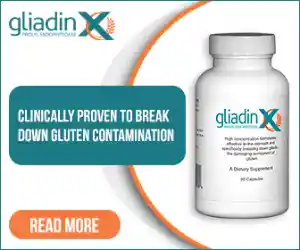-
Welcome to Celiac.com!
You have found your celiac tribe! Join us and ask questions in our forum, share your story, and connect with others.
-
Get Celiac.com Updates:Support Our Content
Does Anyone Else Use Benadryl To Treat Reactions?
-
Get Celiac.com Updates:Support Celiac.com:
-
Recent Activity
-
- Bebygirl01 replied to Bebygirl01's topic in Food Intolerance & Leaky Gut3
Not Just Wheat, Barley and Rye Glutens that make us sick
You are on the money, but I should also add that Italian, French and other countries research shows exactly what I have said. Our FDA is behind the ball when it comes to this research and I am hopeful that Kennedy can straighten this out soon, albeit he is giving the food companies too long to just remove food dyes from our foods when in fact they have to... -
- Dora77 posted a topic in Post Diagnosis, Recovery & Treatment of Celiac Disease0
Energy drink can has stains - potential gluten?
There were small spots (stains) on the drinking area at the top of the energy drinks can from the store that looked as the same color as milk — maybe oat milk (Hafermilch) or a wheat-based drink (Weizendrink), but I’m not sure what it was. There were also some particles that looked like either flour or dust, but not many. Could it have been a gluten-containing dri... -
- Scott Adams replied to Bebygirl01's topic in Food Intolerance & Leaky Gut3
Not Just Wheat, Barley and Rye Glutens that make us sick
This is such an important discussion! While corn gluten (zein) is structurally different from wheat gluten, emerging research suggests some celiac and gluten-sensitive individuals may still react to it, whether due to cross-reactivity, inflammation, or other factors. For those with non-responsive celiac disease or ongoing symptoms, eliminating corn—especially p... -
- Scott Adams replied to Stuartpope's topic in Post Diagnosis, Recovery & Treatment of Celiac Disease3
Mama trying to help 3 year old!!!
I’m so sorry your little one is going through this. Celiac recovery can take time (sometimes months for gut healing), but the ongoing leg pain is concerning. Since his anemia was severe, have his doctors checked his other nutrient levels? Deficiencies in magnesium, vitamin D, or B12 could contribute to muscle/joint pain. A pediatric GI or rheumatologist m...
-











Recommended Posts
Create an account or sign in to comment
You need to be a member in order to leave a comment
Create an account
Sign up for a new account in our community. It's easy!
Register a new accountSign in
Already have an account? Sign in here.
Sign In Now